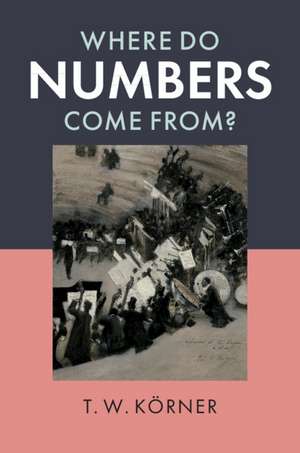Where Do Numbers Come From?
Autor T. W. Körneren Limba Engleză Paperback – 23 oct 2019
| Toate formatele și edițiile | Preț | Express |
|---|---|---|
| Paperback (1) | 288.34 lei 3-5 săpt. | +20.94 lei 7-11 zile |
| Cambridge University Press – 23 oct 2019 | 288.34 lei 3-5 săpt. | +20.94 lei 7-11 zile |
| Hardback (1) | 520.31 lei 6-8 săpt. | |
| Cambridge University Press – 23 oct 2019 | 520.31 lei 6-8 săpt. |
Preț: 288.34 lei
Nou
Puncte Express: 433
Preț estimativ în valută:
55.17€ • 57.61$ • 45.56£
55.17€ • 57.61$ • 45.56£
Carte disponibilă
Livrare economică 25 martie-08 aprilie
Livrare express 11-15 martie pentru 30.93 lei
Preluare comenzi: 021 569.72.76
Specificații
ISBN-13: 9781108738385
ISBN-10: 1108738389
Pagini: 270
Ilustrații: 1 b/w illus. 255 exercises
Dimensiuni: 152 x 228 x 15 mm
Greutate: 0.41 kg
Editura: Cambridge University Press
Colecția Cambridge University Press
Locul publicării:Cambridge, United Kingdom
ISBN-10: 1108738389
Pagini: 270
Ilustrații: 1 b/w illus. 255 exercises
Dimensiuni: 152 x 228 x 15 mm
Greutate: 0.41 kg
Editura: Cambridge University Press
Colecția Cambridge University Press
Locul publicării:Cambridge, United Kingdom
Cuprins
Introduction; Part I. The Rationals: 1. Counting sheep; 2. The strictly positive rationals; 3. The rational numbers; Part II. The Natural Numbers: 4. The golden key; 5. Modular arithmetic; 6. Axioms for the natural numbers; Part III. The Real Numbers (and the Complex Numbers): 7. What is the problem?; 8. And what is its solution?; 9. The complex numbers; 10. A plethora of polynomials; 11. Can we go further?; Appendix A. Products of many elements; Appendix B. nth complex roots; Appendix C. How do quaternions represent rotations?; Appendix D. Why are the quaternions so special?; References; Index.
Recenzii
'Clearly this book is probing the fundamentals of mathematical analysis and will be useful as an extra reading for an introductory calculus course. It will certainly satisfy those readers who are looking for abstraction and who want to extract the maximal number of results from the minimal set of axioms. The historical elements on the side are entertaining … It is an excellent way to get in touch with the foundations of mathematics at a relatively elementary level.' Adhemar Bultheel, European Mathematical Society
'Körner begins with historical anecdotes that illustrate how numbers have been used. He then proceeds to develop number systems axiomatically with careful definitions, theorems and proofs. His characteristic humor, digressions and historical insights are present throughout, but this is a rigorous treatment that seems - in some measure - to follow Dedekind's original approach.' Bill Satze, MAA Reviews
'This is a comfortably paced introduction to the various notions of numbers … The relatively high level of abstraction of the second and third parts suggests that the ideal readership for this book is students who have taken at least some advanced undergraduate classes in mathematics. Classroom use would be possible in a philosophy of mathematics course …' M. Bona, Choice
'The text is peppered with quotes from classical (ancient civilizations), modern (nineteenth and early twentieth centuries), and contemporary mathematical texts; classical, modern and current approaches to most of the subjects covered are offered; and practical applications of most of the materials introduced are carefully explained. As a consequence, there is a constant dialogue between past and present from both a theoretical and a practical point of view, which makes this book interesting from a conceptual point of view and useful as an introductory working tool.' Capi Corrales-Rodriganez, Mathematical Reviews
'Fans of Körner's other books, like The Pleasures of Counting, will appreciate the conversational style of this book, which provides plenty of amusing footnotes, historical context, quotations and poems, while never relenting on the rigour of the mathematics.' Julia Collins, London Mathematical Society Newsletter
'Where Do Numbers Come From? certainly adds to the pleasure of mathematics as well as narrating a journey that surely every mathematician should undertake at some stage. As such, I enthusiastically recommend it to all Gazette readers.' Nick Lord, The Mathematical Gazette
'Körner begins with historical anecdotes that illustrate how numbers have been used. He then proceeds to develop number systems axiomatically with careful definitions, theorems and proofs. His characteristic humor, digressions and historical insights are present throughout, but this is a rigorous treatment that seems - in some measure - to follow Dedekind's original approach.' Bill Satze, MAA Reviews
'This is a comfortably paced introduction to the various notions of numbers … The relatively high level of abstraction of the second and third parts suggests that the ideal readership for this book is students who have taken at least some advanced undergraduate classes in mathematics. Classroom use would be possible in a philosophy of mathematics course …' M. Bona, Choice
'The text is peppered with quotes from classical (ancient civilizations), modern (nineteenth and early twentieth centuries), and contemporary mathematical texts; classical, modern and current approaches to most of the subjects covered are offered; and practical applications of most of the materials introduced are carefully explained. As a consequence, there is a constant dialogue between past and present from both a theoretical and a practical point of view, which makes this book interesting from a conceptual point of view and useful as an introductory working tool.' Capi Corrales-Rodriganez, Mathematical Reviews
'Fans of Körner's other books, like The Pleasures of Counting, will appreciate the conversational style of this book, which provides plenty of amusing footnotes, historical context, quotations and poems, while never relenting on the rigour of the mathematics.' Julia Collins, London Mathematical Society Newsletter
'Where Do Numbers Come From? certainly adds to the pleasure of mathematics as well as narrating a journey that surely every mathematician should undertake at some stage. As such, I enthusiastically recommend it to all Gazette readers.' Nick Lord, The Mathematical Gazette
Notă biografică
Descriere
A clear, entertaining development of the number systems required in any course of modern mathematics.
